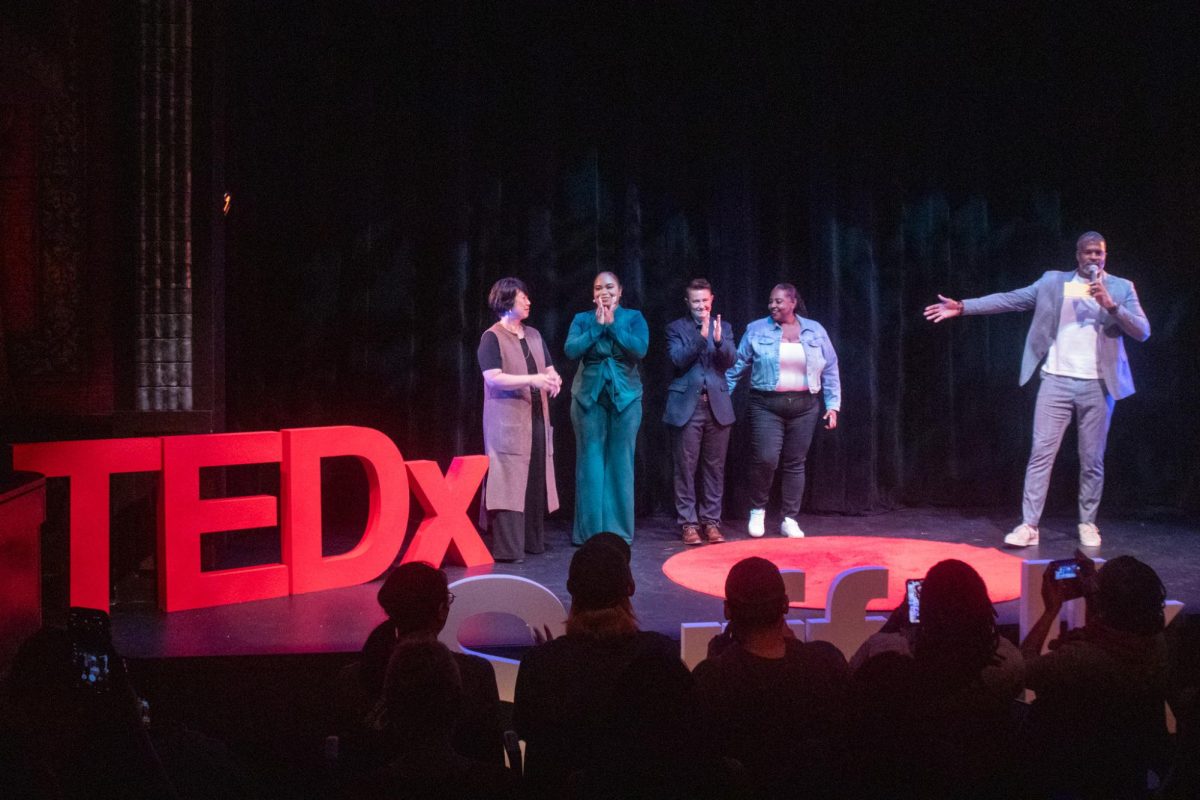Suffolk University’s Center for Student Diversity and Inclusion hosted performance groups and speakers at the Modern Theater Sept. 27 for “Civil Discourse and…,” a TEDx event focused on the intersection of identity and experience with how civil discourse happens in the United States.
TEDx events are independently organized with licensing from TED, the company that produces TED Talks, utilizing a similar format but with topics catered to the community they take place in.
James Lambert III was master of ceremonies for the event. He is the co-founder of Making Human Technical, a diversity, equity and inclusion consulting firm, and founder of Third Exposure, focused on business upscaling and event architecture.
Four speakers, Su Joun, Alexandria C. Onuoha, Christin Santiago and Jacquetta Van Zandt, participated in the event. They spoke on their ideas for how people can adapt their behavior in civil discourse to better listen to differing outlooks.
“In the current world of polarized points of view and divided perspectives on life and the world, we would like to emphasize talks describing innovative ‘lenses,’” CSDI wrote in an Instagram post for the event.
Performances by Drumatix, Sol Y Canto and Suffolk’s Pasión Latina were set in between talks as “palate cleansers” for the audience.
“A framework for civility”
Joun is the Principal of Diversity@Workplace Consulting Group, which works with companies to create inclusive and equitable work processes and diversify their workforce. She received her executive MBA from Suffolk and has taught classes in the Sawyer Business School.
In her talk, Joun outlined a “framework for civility” to be used in civil discourse conversations. While people have differing perspectives on what civility means, she said it is important to outline expectations in order for conversations about difficult topics to be productive.
Part of this is done by creating mechanisms for conversations to take place, Joun said, like having a facilitator allow people the opportunity to share their experience without forcing them to.
She encouraged people to listen to others using a “discourse forward” approach, where perspectives are shared with the intention to bring people close together.
“Black girl joy”
Onuoha, a doctoral candidate in applied developmental psychology at Suffolk, said her mission is to enhance joy in Black girls through her research examining how psychosocial well-being is impacted by a person’s environment. She is the founder of ACO STYLES, a creative arts initiative dedicated to empowering Black girls through dance.
Joy isn’t necessarily about happiness, Onuoha said, but a decision to withstand difficulties and the opportunity to create a space where positive connections form.
In her work with Black girls, Onuoha emphasizes joy every day. Black girls face discrimination from many angles, she said, but navigate pain and trauma through joyful experiences.
“[Black girls’] joy serves as a model of creativity, illustrating how joy can solve issues,” Onuoha said. “When we choose joy to solve issues, we come up with solutions.”
Onuoha said that to create change, it is necessary to actively choose joy as a tool for transformation.
“Empowerment through understanding”
Santiago is a clinical recreation therapist with over 25 years of experience and Commonwealth Fellow at Suffolk receiving her master’s in public administration. She works with youth and adolescents who experienced trauma and present with challenging behavior to build resilience and empowerment. She is also a Special Olympics coach and was inducted into the Special Olympics Hall of Fame in 2019.
Labeling a person on first impression is a normal human behavior, Santiago said. Regardless of a label being positive or negative, she said a person’s relationship with a label has a significant impact on how they interact with the world.
Through her work as a therapist, Santiago saw the effect labels had on the trajectory of young peoples’ lives. Labels like “dangerous” or “aggressive” created a cycle where behaviors were inherently attributed to the label, which reinforced the label and led to internalized belief of the label.
Labels only explain what behaviors are apparent, Santiago said, but behaviors are an insight into the many elements impacting a person at a given time. It is important to give grace to behaviors that can present a certain way with the understanding of the many factors at play, she said.
To help individuals struggling, Santiago said to be genuinely curious, non-judgemental and validate their experience, which builds empowerment over time.
“The rise of social media clout chasing”
Van Zandt is the vice president of engagement at the Partnership Inc. and political strategist. She hosts a current events podcast, “Politics and Prosecco” with Lori Lennon and serves on the board of directors for the Urban League of Eastern Massachusetts.
In the digital age, social media is a go-to platform for civil discourse for many, especially young people. Van Zandt explained how social media emphasizes quantity over quality which leads to more divisive conversations.
She said the images portrayed on social media create an illusion of what it means to be successful that does not align with reality. Success is not determined by social media influence, Van Zandt said, but actions that establish positive connections to others.





















